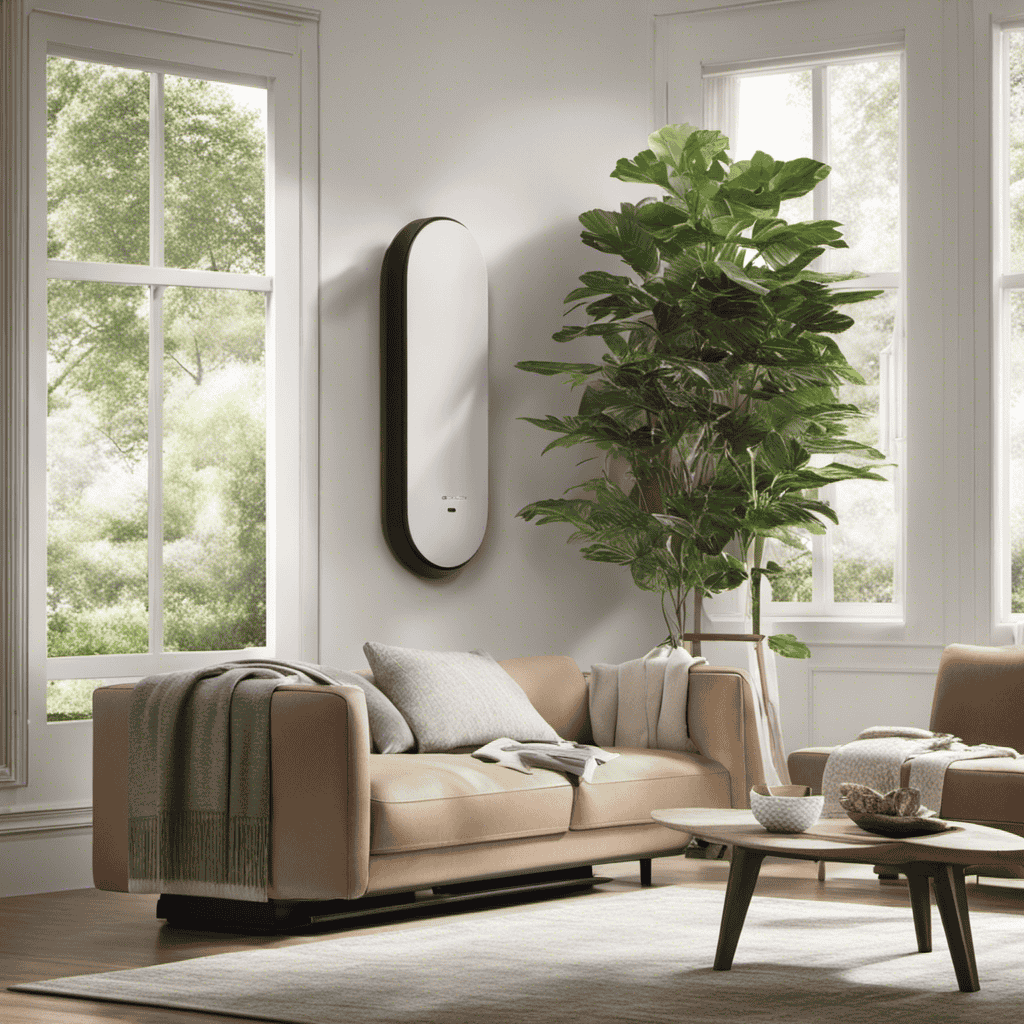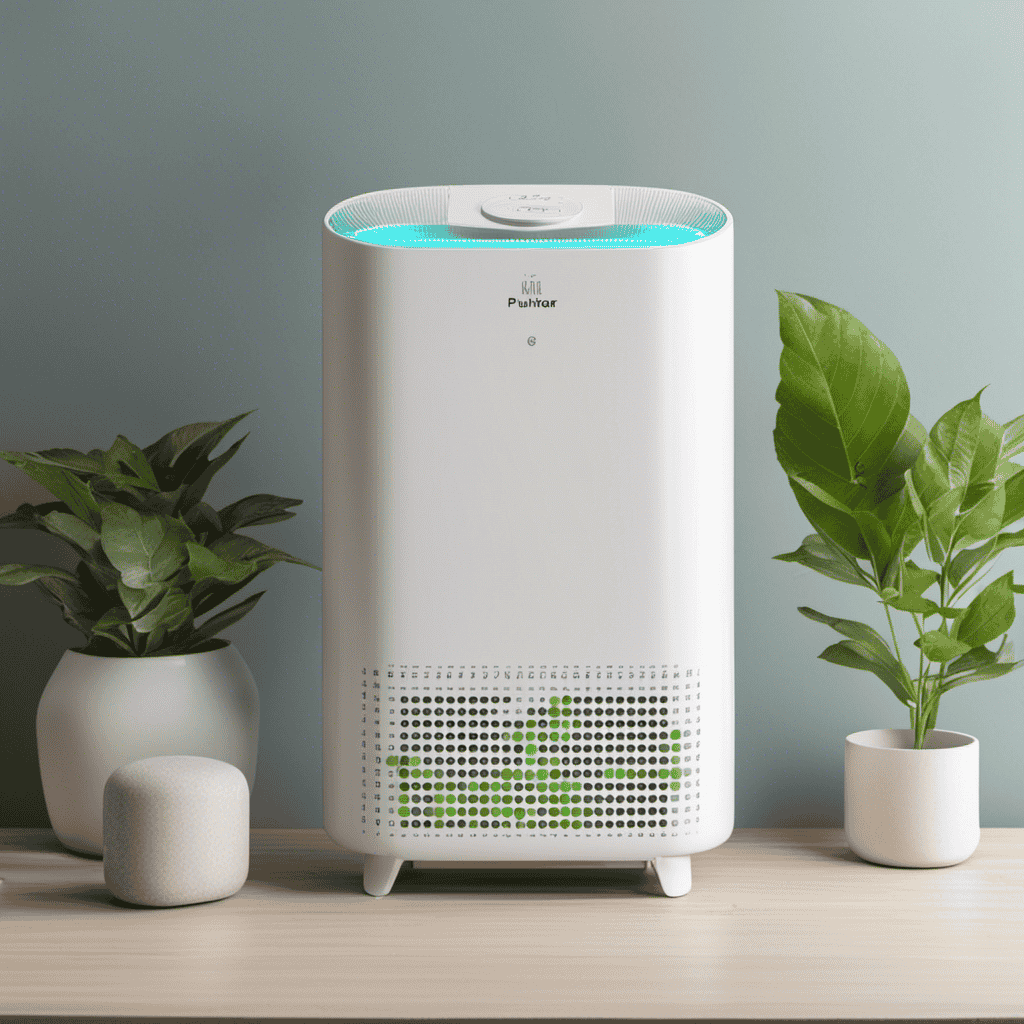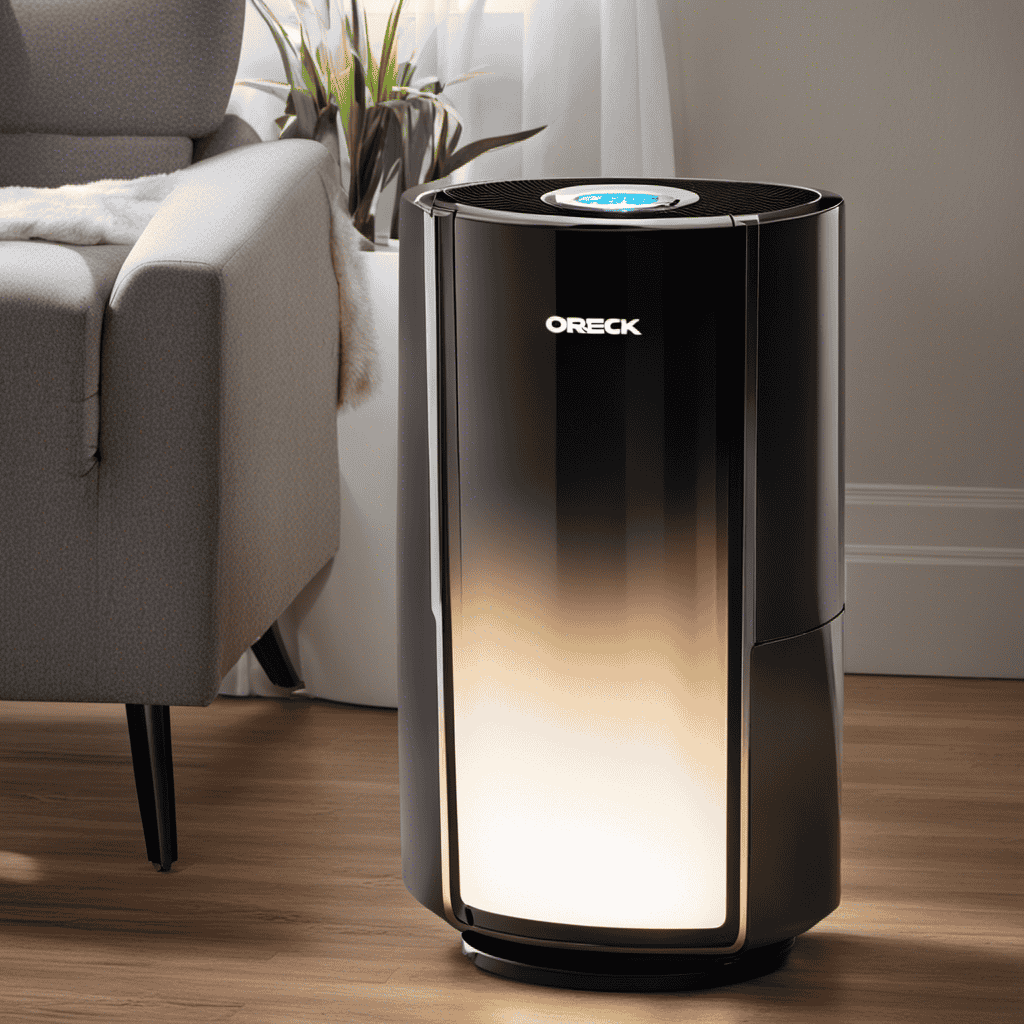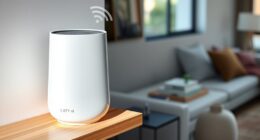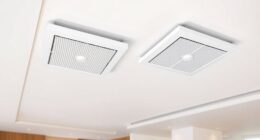I’ve always been concerned about the quality of the air I breathe, especially indoors. That’s why I made the decision to purchase an air purifier.
Did you know that the air inside our homes can be up to five times more polluted than the air outside? It’s a startling fact that many people are unaware of. But with an air purifier, you can effectively remove harmful pollutants and improve the indoor air quality.
In this article, we’ll explore the various health benefits of air purifiers and why they are a must-have for any home.
Key Takeaways
- Air purifiers remove harmful pollutants from the air, improving overall air quality.
- Air purifiers can significantly improve sleep quality by reducing allergens in the air.
- Air purifiers are beneficial for pet owners, as they reduce allergic reactions and eliminate pet odors.
- Different types of air purifiers target specific pollutants, such as dust, pollen, pet dander, mold spores, and odors.
Health Benefits of Air Purifiers
Air purifiers can help improve my overall health by removing harmful pollutants from the air I breathe.
One of the key benefits of using air purifiers is better sleep quality. Air purifiers remove allergens such as dust mites, pollen, and pet dander that can trigger allergies and disrupt sleep. By reducing these allergens, air purifiers create a cleaner and healthier environment, allowing for a more restful sleep.
This is especially beneficial for pet owners, as air purifiers can effectively remove pet hair and dander from the air, reducing the likelihood of allergic reactions. Additionally, air purifiers can help eliminate odors caused by pets, creating a fresher and more pleasant sleeping environment.
Overall, air purifiers provide significant health benefits, particularly for better sleep and for pet owners.
Types of Air Pollutants Removed by Air Purifiers
When it comes to types of pollutants, you’ll be surprised at how many harmful particles can be eliminated by using an air purifier. Air purifiers are equipped with advanced technologies that can effectively remove various pollutants from the air we breathe.
These technologies include high-efficiency particulate air (HEPA) filters, activated carbon filters, and ultraviolet germicidal irradiation (UVGI). HEPA filters are capable of trapping tiny particles such as dust, pollen, pet dander, and mold spores.
Activated carbon filters, on the other hand, excel at removing odors and volatile organic compounds (VOCs) from the air. UVGI technology helps in killing bacteria, viruses, and other pathogens.
How Air Purifiers Improve Indoor Air Quality
You’ll be amazed at the improvement in your indoor air quality when you start utilizing an air purifier. Air purifiers offer numerous benefits and are highly effective in removing pollutants from the air.
These devices are designed to capture and trap particles such as dust, pollen, pet dander, and mold spores, which can cause allergies and respiratory issues. Additionally, air purifiers can help eliminate odors from cooking, smoking, and pets. They are particularly beneficial for individuals with asthma or other respiratory conditions, as they can reduce the presence of irritants in the air.
Scientific studies have shown that air purifiers can significantly reduce indoor air pollution and improve overall air quality. By investing in an air purifier, you can create a healthier and more comfortable living environment for yourself and your family.
Choosing the Right Air Purifier for Your Home
Choosing the right air purifier for your home can be overwhelming, but it’s worth taking the time to research different models and consider your specific needs. With so many air purifier brands available on the market, it’s important to find one that suits your requirements and budget.
Here are some key factors to consider when choosing an air purifier:
-
Filtration system: Look for air purifiers with HEPA filters, as they can remove up to 99.97% of airborne particles, including dust, pollen, and pet dander.
-
Room size: Consider the square footage of the room where you plan to use the air purifier. Different models are designed to cover different room sizes.
-
Noise level: If you’re planning to use the air purifier in a bedroom or office, look for models with low noise levels to ensure a peaceful environment.
Once you’ve chosen the right air purifier for your home, it’s important to maintain it properly. Regular maintenance includes cleaning or replacing filters, checking the airflow, and cleaning the unit itself. Following the manufacturer’s instructions will help ensure the longevity and efficiency of your air purifier.
Common Misconceptions About Air Purifiers
One common misconception about air purifiers is that they eliminate all odors in your home. However, they are actually designed to remove airborne particles, not odors.
Air purifiers work by filtering the air and capturing particles such as dust, pollen, pet dander, and mold spores. Some models may have additional features like activated carbon filters to help reduce odors.
Their main purpose is to improve indoor air quality by removing pollutants. It’s important to understand that air purifiers cannot completely eliminate all odors, especially those deeply embedded in furniture or carpets.
They can, however, help to reduce unpleasant smells by removing the particles that may be causing them. So, if you’re looking to eliminate odors, it’s best to address the source of the odor directly, rather than relying solely on an air purifier.
The Role of Air Purifiers in Allergy Relief
If you suffer from allergies, an air purifier can help alleviate symptoms by removing airborne allergens. Here are some ways air purifiers can improve allergy relief:
- Air purifiers can effectively filter out pet dander, which is a common allergen that can cause sneezing, coughing, and itchy eyes.
- During allergy seasons, air purifiers can capture and eliminate pollen and other seasonal allergens from the air, reducing symptoms such as nasal congestion and watery eyes.
- Air purifiers equipped with HEPA filters can trap tiny dust mites and their waste particles, reducing the risk of allergic reactions.
By using an air purifier, you can create a cleaner and healthier indoor environment, free from common allergens that trigger your allergies. This can lead to a significant improvement in allergy symptoms and overall quality of life.
Now, let’s explore how air purifiers can also play a role in managing asthma.
Air Purifiers and Asthma Management
After discussing the role of air purifiers in allergy relief, let’s now explore their impact on asthma management.
Air purifiers can be extremely beneficial for individuals with asthma, as they help remove airborne triggers that can trigger asthma symptoms.
One common trigger for asthma is pet dander, and air purifiers can effectively capture and eliminate these allergens from the air. Additionally, air purifiers can also help with seasonal allergies, as they filter out pollen and other irritants that can worsen asthma symptoms during certain times of the year.
By reducing the presence of these triggers, air purifiers can create a cleaner and healthier environment for individuals with asthma.
Now, let’s dive into the impact of air purifiers on respiratory health in more detail.
The Impact of Air Purifiers on Respiratory Health
Let’s now explore how air purifiers can improve respiratory health by reducing the presence of airborne triggers.
Air purifier technologies have advanced significantly in recent years, making them more effective than ever at removing allergens, pollutants, and other harmful particles from the air we breathe.
Here are three key ways in which air purifiers can have a positive impact on respiratory health:
-
Filtration: High-efficiency particulate air (HEPA) filters are commonly used in air purifiers to capture airborne particles as small as 0.3 microns, including pollen, pet dander, and dust mites.
-
Activated carbon filters: These filters effectively trap and remove harmful gases, volatile organic compounds (VOCs), and odors, improving indoor air quality.
-
UV-C light technology: Some air purifiers use ultraviolet germicidal irradiation to neutralize bacteria, viruses, and mold spores, reducing the risk of respiratory infections.
By incorporating these air purifier technologies, individuals can experience improved respiratory health and a reduction in asthma and allergy symptoms.
To ensure optimal performance, it is crucial to maintain and clean your air purifier regularly.
Maintaining and Cleaning Your Air Purifier for Optimal Performance
To ensure your air purifier performs optimally, make sure to regularly clean and maintain it. Proper maintenance and cleaning of your air purifier not only prolong its lifespan but also ensures that it continues to effectively remove pollutants from the air. Here is a simple guide to help you with air purifier maintenance and cleaning:
| Maintenance Tips | Cleaning Tips |
|---|---|
| Replace filters regularly | Wipe down the exterior with a soft cloth |
| Check for any loose parts | Vacuum the intake vents and grill regularly |
| Keep the unit in a clean area | Use a mild detergent to clean washable filters |
| Avoid using near open windows | Clean or replace pre-filters as necessary |
| Follow manufacturer’s guidelines | Clean the ionizer or electrostatic precipitator |
Frequently Asked Questions
Are Air Purifiers Effective in Eliminating Odors From the Air?
Yes, air purifiers are effective in eliminating odors from the air. They work by filtering out particles and pollutants that cause odors, leaving the air fresh and clean.
Can Air Purifiers Remove Allergens That Are Embedded in Carpets and Furniture?
Can air purifiers effectively remove allergens embedded in carpets and furniture? Yes, they can. Air purifiers have been proven to improve indoor air quality by eliminating allergens, such as dust mites and pet dander, providing numerous benefits for respiratory health.
Do Air Purifiers Help in Reducing the Spread of Airborne Viruses?
Yes, air purifiers can help reduce the spread of airborne viruses. They filter out particles that carry viruses, improving indoor air quality and promoting respiratory health.
Can Air Purifiers Remove Mold Spores From the Air?
Yes, air purifiers can remove mold spores from the air. They filter out microscopic particles, including mold spores, improving indoor air quality. Regular maintenance, such as changing filters, is necessary to ensure their effectiveness.
Are There Any Potential Side Effects or Risks Associated With Using Air Purifiers?
There may be potential health risks and long-term effects associated with using air purifiers. It is important to consider these factors before deciding to use one in your home or office.
Conclusion
After exploring the health benefits of air purifiers, it is clear that these devices play a crucial role in improving indoor air quality. They effectively remove various types of air pollutants, helping to alleviate allergies and asthma symptoms. The impact on respiratory health is undeniable, as air purifiers create a cleaner and healthier environment.
It is important to maintain and clean your air purifier regularly to ensure optimal performance. Don’t underestimate the power of these devices in keeping the air we breathe fresh and pure.
